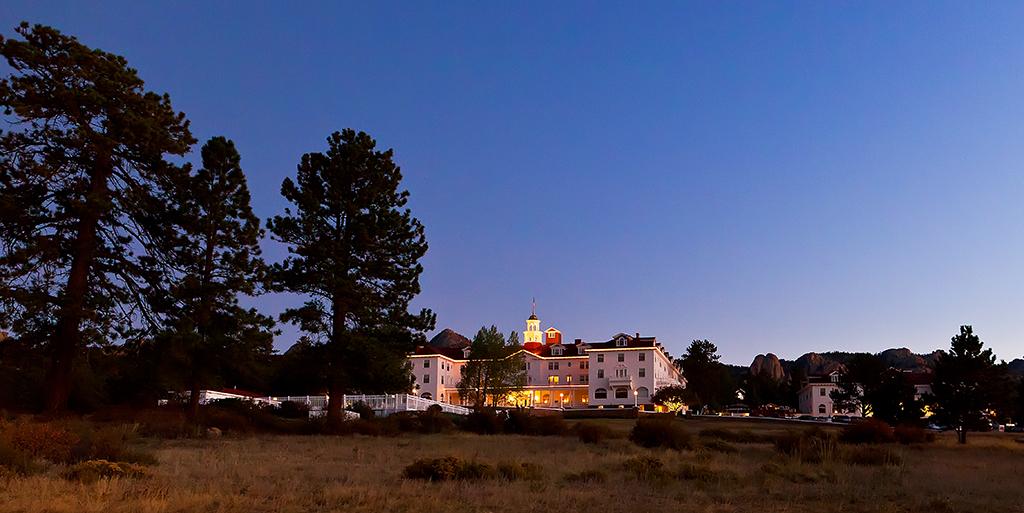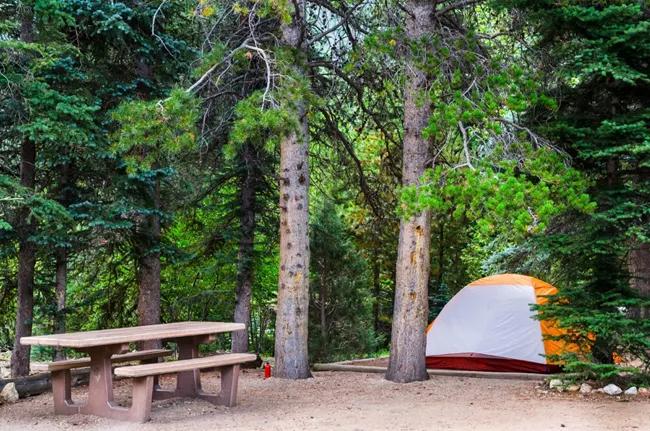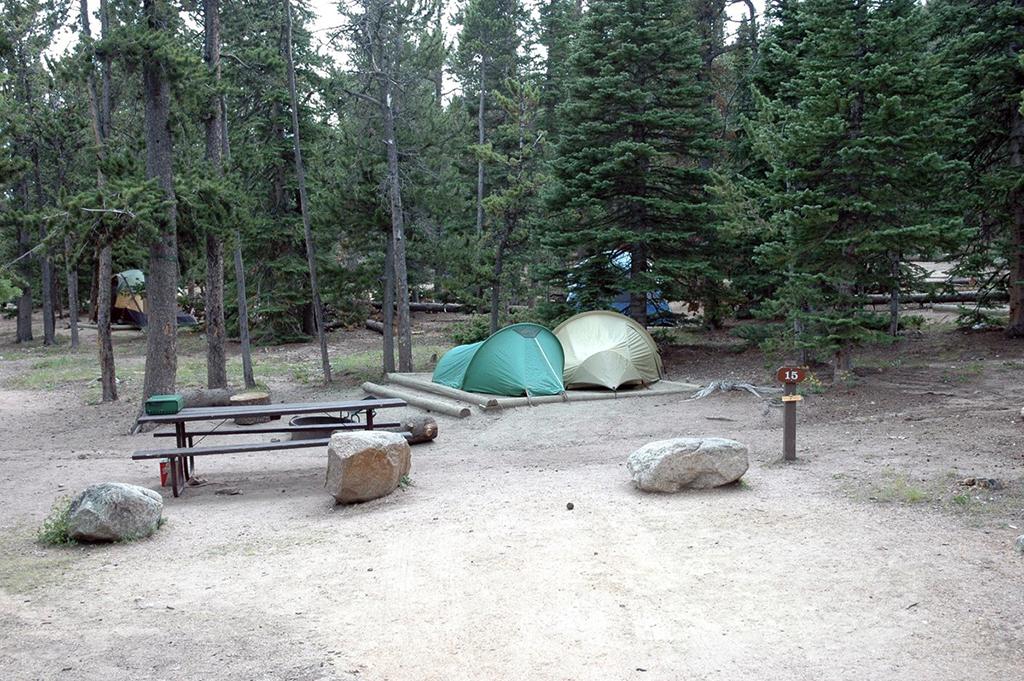While there is no in-park lodging at Rocky Mountain National Park in Colorado, the gateway towns of Estes Park and Grand Lake offer overnight options ranging from a historic haunted hotel to cabins, lodges, hotels/motels, B&Bs, and vacation rentals. If you’d rather pitch a tent or park your RV directly beneath the stars, the park offers five frontcountry campgrounds accessible by vehicle, as well as numerous designated campsites within the backcountry.
Lodging
For brick-and-mortar lodging, check out Grand Lake and Estes Park. Because these are gateway towns catering to all the visitors traveling to see the park, there are plenty of overnight options, including the historic, supposedly haunted Stanley Hotel in Estes Park, which served as the inspiration for the Overlook Hotel in Stephen King's 1977 novel The Shining and its 1980 film adaptation. Built in 1909 and now listed on the National Register of Historic Places, The Stanley Hotel is about five miles (eight kilometers) away from Rocky Mountain National Park’s Beaver Meadows entrance.

The Stanley Hotel at sunrise in Estes Park, five miles from Rocky Mountain National Park / Rebecca Latson
Camping
The five frontcountry campgrounds are all accessible by vehicle. While the park is open year-round, only one of these campgrounds is available for use during the winter, and only one campground is first-come, first-served only. Senior/Access passholders receive a 50 percent discount on campsites.
Below is a quick rundown of each campground. For more detailed information, click on the campground name or the recreation.gov link for each campground.

Tents at Aspenglen Campground, Rocky Mountain National Park / NPS-D. Biddle
Aspenglen Campground is open year-round and offers 52 sites (13 tent-only), including 3 ADA-accessible sites (005, 030, and 031). Maximum RV/trailer length is 30 feet (9.1 meters). There is no dump station nor any hookups and generators are only allowed in Loop C between 7:30 a.m. - 10 a.m. and 4 p.m. - 8:30 p.m. Drinking water and portable toilets are seasonal; trash collection is year-round.
Campsites are $30 per night and first-come, first-served January 1, 2025 – May 18, 2025. During the peak season of May 22, 2025 – September 28, 2025, sites are $35 per night and a reservation is required through recreation.gov.
Glacier Basin Campground is open May 22, 2025 – September 7, 2025 and offers 150 sites (73 tent-only) including 3 ADA-accessible sites (B033, B035, B060). There are also 13 group sites (tent-only) which will hold between 15 and 40 people, depending upon the site. Maximum RV/trailer length is 35 feet (10.7 meters). Drinking water, trash, flush toilets, and dump station are seasonally available. There are no hookups.
Standard sites are $35 per night. The small group sites (9 – 15 people) are $50 per night, medium group sites (16 – 25 people) are $60 per night, and large group sites (26 – 40 people) are $70 per night. Reservations for standard and group sites are required through recreation.gov.
Longs Peak Campground is open July 3, 2025 – September 8, 2025 and offers 26 tent-only sites (none ADA-accessible); RVs/trailers are not permitted. There is no water available at this campground. Trash collection is seasonal and vault toilets are available year-round. This is the only campground within the park that is first-come, first-served. Sites are $30 per night.

A site at Longs Peak Campground, Rocky Mountain National Park / NPS file
Moraine Park Campground is currently closed due to the Moraine Park Campground & Headquarters East Utility Restoration Project, but is expected to reopen sometime during the summer of 2025.
Timber Creek Campground is open May 22, 2025 – October 5, 2025 and offers 98 sites (30 tent-only) including 4 ADA-accessible sites (B022, B024, B026, B039). Maximum RV/trailer length is 35 feet (9.1 meters). There are no hookups. Dump station, drinking water, trash collection, and flush toilets are available seasonally.
Sites are $35 per night and reservations are required through recreation.gov.
Winter Camping
Rocky Mountain National Park is open year-round, and so is one campground (Aspenglen). It takes a little more to overnight in the winter there, but it’s a unique experience and you’ll definitely find solitude and no crowds.
Park staff advises the following for winter camping:
How to Check In:
- Sites are available on a first come, first-served basis. A limited number of sites will be open in the C-Loop only.
- First, campers should proceed to Aspenglen Campground and pick out a campsite. Set up your campsite.
- Next, after setting up your campsite, drive to Fall River Entrance to pay your camping fee in person with the ranger in the kiosk.
Additional Things to Know When Planning a Winter Camping Trip
- All campsites have a table, tent pad, and fire grate.
- Bring your own water with you. Water is not available in the campground during the winter season. There is no dump station available.
- Flush toilets are not operational during the winter season. Portable toilets are provided.
- Campsites are not plowed or shoveled; Campers are advised to pack a shovel and be prepared to dig out your own campsite.
- When it snows, plowing the main park roads are our number one priority. Snowplows will plow campground roads, but expect delays.
Backcountry Camping

Tents at a wilderness campsite, Rocky Mountain National Park / NPS file
If you really want to experience solitude and no crowds while exploring the hinterlands of Rocky Mountain National Park, then strap on your pack, tent, and sleeping pad and head out into the backcountry.
You will need a physical permit as well as an overnight dashtag for your vehicle (which comes with the permit) through recreation.gov. You must carry the permit with you during your backcountry trip.
There are many designated backcountry campsites available (see map below).
For more detailed information and tips about planning a backcountry trip, click the Backcountry Camping header above.





